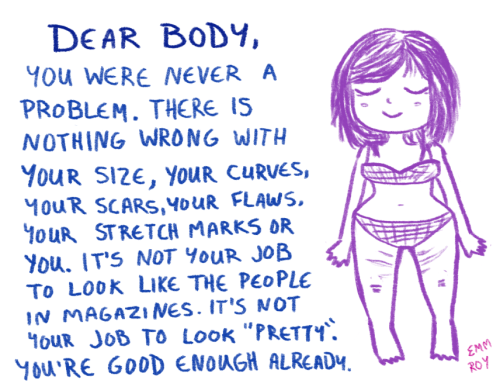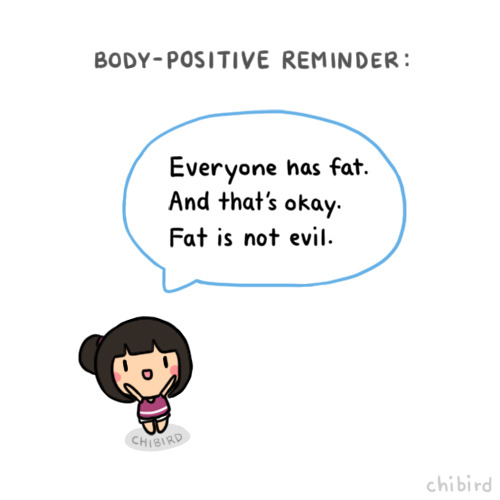Read again: you cannot properly recover from an eating disorder without gaining weight.
You can lie to yourself that you are getting better, you can think that you are recovering because eating something is better than nothing...right?
And add this one for good measure: you cannot properly recover without gaining water, food, muscle, and fat.
There, I said it. Fat. FAT. F A T. The terrible three-lettered word.
 |
| Image source: positivedoodles.tumblr.com |
So you expect to gain weight during recover. But how much? How fast? Am I gaining too much weight? Why am I only gaining weight in my stomach and thighs? Why am I getting so...jiggly?
Let's start from the beginning. Weight gain comes from a multitude of sources: food, muscle, water, and fat.
Food
 |
| Image course: positivedoodles.tumblr.com |
The same thing applies when you start eating (more) again. Your body will hold more food in it and the scale will reflect a (sometimes dramatic) jump. Keep in mind that your digestive system is considered a "closed" system, meaning that food in your stomach and intestines are never considered inside your body - it is merely going down a tube through your body.
In recovery, when you eat, you may experience constipation, never feeling hungry, nausea, bloating, or stomach cramps. When you restrict, your digestive system slows down considerably because it is desperately trying to extract every little bit of energy that you may take in. In addition, digestive functions tend to be extremely impaired, so your body is able to fully process food a lot less than a "normal" person (meaning you take less calories from the food you eat). Because of this, the food that you eat on day 1 in recovery may still be in your body on day 5, 10, or 20 even! If you eat five pounds of food a day (which really is not that much - especially when you eat water-rich foods, which is common in people in eating disorders), you very well can wake up 5 pounds heavier the next day just from the food in the body. Now multiple this 5 pounds by 2, 3, or 4 days and you'll realize that the weight quickly adds up.
Muscle
If you ask any experienced body builder, he will tell you that a person doesn't gain muscle in the gym but rather in bed. Recovery is just as important as if not more important than strength training for muscle growth. When you restrict, your body breaks down muscle fibers for energy to keep you alive. After all, muscle simply just isn't too important when your body is in starvation mode. When you start feeding your body in a calorie surplus again and remain inactive you will begin to build up the muscle fibers without doing any strength training at all. As a result of increased muscle mass, the scale shows weight gain.
 |
| Image source: arthlete.tumblr.com |
Water weighs a whole lot and the human body is actually made up of 60% water. That means that if you were to weigh about 130 pounds (roughly 60 kilograms), then your body will actually have almost 80 pounds (36 kilograms) of pure water.
One liter of water weighs one kilogram and just like food, water will have the same weight in and out of your body. Thus, if you drink a liter of water, your weight will actually increase by one kilogram. For a someone who has restricted, two major things happen. First, because you have been restricting for so long, your body is just extremely dehydrated with severe electrolyte imbalance. As a result, your body will want to hold onto every single drop of water it can get to, from both food and water. Most foods are actually quite water rich (fruits are about 80-90% and vegetables are about 90-95%), especially the ones that most people with eating disorders find safe, so that means if you eat a kilogram of strawberries, your body can hold up to 900 grams of water.
In addition, when you restrict, your tissues become incredibly damaged because they do not have the energy to do the necessary repairs "normal" tissues will do on a daily basis. When damaged tissues start repairing, the first thing that occurs is inflammation and edema (or water retention). It's like when you get a blister from tight shoes and having that water-filled sac over the blister. As a result though, it is someone with an eating disorder's worst nightmare: you become bloated, visibly larger, and "flabby", but remember, this is water, not fat. Inflammation is actually a good sign and means your body is recovering!
Fat
 |
| Image source: chibird.tumblr.com |
The first place that it will store the excess energy away is your muscles and liver as glycogen, but it can only store a little. Body fat is a better, more long term, easily accessible storage method. As a result, your body will store fat and in the first stages of recovery, this fat will most likely be in your midsection because that is the place that is most easily accessible to use. Eventually though, and only when your body starts trusting you again after you consistently eat more than enough calories, your metabolism will catch up. Your body fat will redistribute to other parts of your body. But ONLY if you eat enough every single day.
Body fat is not a bad thing. In fact, it is necessary. It keeps you warm, protects your organs, helps create hormones. You cannot function without body fat. Remember, you are not fat. You just have fat. And that's completely normal.
I'm not going to lie, weight gain is scary, but you have to understand that it is completely normal and necessary. I highly recommend not weighing yourself more than once a week during recovery, just to make sure that you are gaining weight. If not, then you need to increase your calories, even if you are already eating the MINIMUM recommended 3000.
The number on the scale is only a number, a man-made number created to label things. You are not that number. Your worth is not defined by that number. The weight gain will eventually slow down and stop as long as you eat enough and properly recover. Your body is a magnificent vessel; just eat, rest, and it will take care of the rest as long as you take care of it.
 |
| Image source: chibird.tumblr.com |
